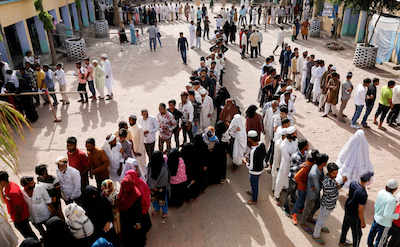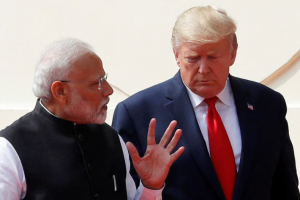Indian authorities will rerun voting at a number of polling stations in the northeastern state of Manipur on Monday, after reports of violence and damage to voting machines in the state torn by months of ethnic clashes.
Friday marked the start of voting by nearly one billion people in the world’s most-populous country, in an election running through until June 1. The second phase of the seven-part election takes place on Friday.
Prime Minister Narendra Modi is forecast to win a rare third term on the back of issues such as growth, welfare and Hindu nationalism.
The vote pits Modi’s Bharatiya Janata Party (BJP) against an alliance of two dozen opposition parties that promise greater affirmative action and more handouts while stressing what they call the need to save democratic institutions.
Also on AF: Chinese Hackers Poised to Strike at US Infrastructure: FBI Director
Nearly 970 million people are eligible to vote in the multi-phase exercise, which runs through the peak of summer until June 1, with results set for June 4.
Friday’s vote covered 166 million voters in 102 constituencies across 21 states and territories, from Tamil Nadu in the south to Arunachal Pradesh on the Himalayan frontier with China.
Hindu nationalism is a key election theme, especially after Modi’s consecration of a grand temple to Lord Ram in January on a site in Uttar Pradesh believed to be his birthplace, more than three decades after a Hindu mob destroyed a 16th-century mosque that had stood there, leading to nationwide religious riots.
In 2019, the Supreme Court handed over the land to Hindus and ordered allotment of a separate plot to Muslims to build a new mosque.
Critics accuse Modi’s government and party of treating India’s 200 million minority Muslims unfairly to please their hardline Hindu base – an accusation that both deny.
Modi Targets Two-Thirds Majority
Modi aims to win 370 of parliament’s 543 seats, up from 303 in 2019, hoping for a two-thirds majority that some analysts and opposition members fear could let his party usher in far-reaching constitutional changes.
Campaigning continues during the election process for seats that are scheduled to vote in later phases.
Victory for Modi would make him only the second Indian prime minister to be elected three times in a row, after post-independence leader Jawaharlal Nehru.
Surveys show a big gap between the BJP and the opposition but political analyst Sandeep Shastri of research firm Lokniti Network said it was not “necessarily unsurmountable”.
“Many voters say that we take our decision on who to vote for during campaigning and many say we do it closer to the day of voting,” he said. “So there is also scope for campaigning to impact the nature of the verdict.”
But some BJP insiders and analysts say the party is worried about complacency or overconfidence among voters and party members, and needs to draw more people to vote.
- Reuters with additional editing by Sean O’Meara
Read more:
Indian Stocks Miss Out On Traditional Pre-Election Rally
Rupee Plummets to Record Dollar Low, Yuan Pressure Blamed
India in $100 billion Investment Deal With Europe Trade Group
India To Pump $1.2 Billion Into AI Projects, Startups
India’s Push For Tariffs on Data Transfers Alarms Chip Giants






















